Related Research Articles
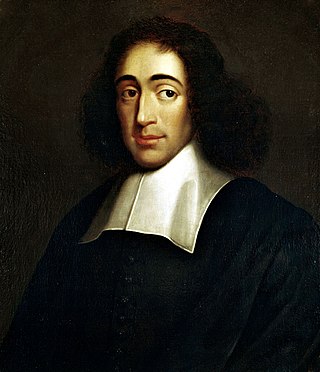
Baruch (de) Spinoza, also known under his Latinized pen name Benedictus de Spinoza, was a philosopher of Portuguese-Jewish origin. As a forerunner of the Age of Enlightenment, Spinoza significantly influenced modern biblical criticism, 17th-century rationalism, and Dutch intellectual culture, establishing himself as one of the most important and radical philosophers of the early modern period. Influenced by Stoicism, Thomas Hobbes, René Descartes, Ibn Tufayl, and heterodox Christians, Spinoza was a leading philosopher of the Dutch Golden Age.

René Descartes was a French philosopher, scientist, and mathematician, widely considered a seminal figure in the emergence of modern philosophy and science. Mathematics was paramount to his method of inquiry, and he connected the previously separate fields of geometry and algebra into analytic geometry. Descartes spent much of his working life in the Dutch Republic, initially serving the Dutch States Army, and later becoming a central intellectual of the Dutch Golden Age. Although he served a Protestant state and was later counted as a deist by critics, Descartes was Roman Catholic.
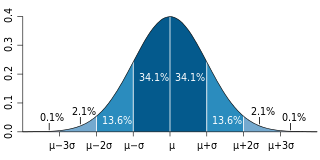
Determinism is the philosophical view that all events in the universe, including human decisions and actions, are causally inevitable. Deterministic theories throughout the history of philosophy have developed from diverse and sometimes overlapping motives and considerations. Like eternalism, determinism focuses on particular events rather than the future as a concept. The opposite of determinism is indeterminism, or the view that events are not deterministically caused but rather occur due to chance. Determinism is often contrasted with free will, although some philosophers claim that the two are compatible.
In philosophy, rationalism is the epistemological view that "regards reason as the chief source and test of knowledge" or "any view appealing to reason as a source of knowledge or justification", often in contrast to other possible sources of knowledge such as faith, tradition, or sensory experience. More formally, rationalism is defined as a methodology or a theory "in which the criterion of truth is not sensory but intellectual and deductive".

Nicolas Malebranche was a French Oratorian Catholic priest and rationalist philosopher. In his works, he sought to synthesize the thought of St. Augustine and Descartes, in order to demonstrate the active role of God in every aspect of the world. Malebranche is best known for his doctrines of vision in God, occasionalism and ontologism.

Mental substance, according to the idea held by dualists and idealists, is a non-physical substance of which minds are composed. This substance is often referred to as consciousness.

The Euthyphro dilemma is found in Plato's dialogue Euthyphro, in which Socrates asks Euthyphro, "Is the pious loved by the gods because it is pious, or is it pious because it is loved by the gods?" (10a)
In philosophy, metaphysical necessity, sometimes called broad logical necessity, is one of many different kinds of necessity, which sits between logical necessity and nomological necessity, in the sense that logical necessity entails metaphysical necessity, but not vice versa, and metaphysical necessity entails physical necessity, but not vice versa. A proposition is said to be necessary if it could not have failed to be the case. Nomological necessity is necessity according to the laws of physics and logical necessity is necessity according to the laws of logic, while metaphysical necessities are necessary in the sense that the world could not possibly have been otherwise. What facts are metaphysically necessary, and on what basis we might view certain facts as metaphysically but not logically necessary are subjects of substantial discussion in contemporary philosophy.

Thomism is the philosophical and theological school which arose as a legacy of the work and thought of Thomas Aquinas (1225–1274), the Dominican philosopher, theologian, and Doctor of the Church.

Teachings of Opus Dei are the teachings of the founder of Opus Dei, St. Josemaría Escrivá de Balaguer.
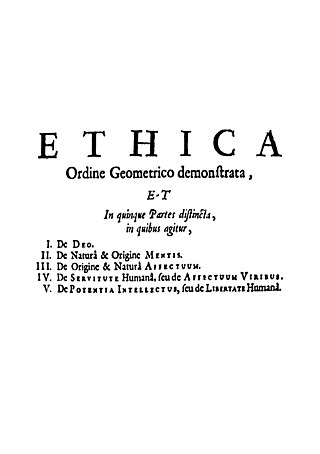
Ethics, Demonstrated in Geometrical Order, usually known as the Ethics, is a philosophical treatise written in Latin by Baruch Spinoza. It was written between 1661 and 1675 and was first published posthumously in 1677.
In the philosophy of mind, psychophysical parallelism is the theory that mental and bodily events are perfectly coordinated, without any causal interaction between them. As such, it affirms the correlation of mental and bodily events, but denies a direct cause and effect relation between mind and body. This coordination of mental and bodily events has been postulated to occur either in advance by means of God or at the time of the event or, finally, according to Baruch Spinoza's Ethics, mind and matter are two of infinite attributes of the only Substance-God, which go as one without interacting with each other. On this view, mental and bodily phenomena are independent yet inseparable, like two sides of a coin.
Theological determinism is a form of predeterminism which states that all events that happen are pre-ordained, and/or predestined to happen, by one or more divine beings, or that they are destined to occur given the divine beings' omniscience. Theological determinism exists in a number of religions, including Jainism, Judaism, Christianity, and Islam. It is also supported by proponents of Classical pantheism such as the Stoics and by philosophers such as Baruch Spinoza.
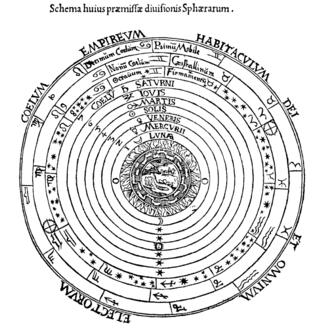
Nous, from Greek: νοῦς, is a concept from classical philosophy, sometimes equated to intellect or intelligence, for the faculty of the human mind necessary for understanding what is true or real.
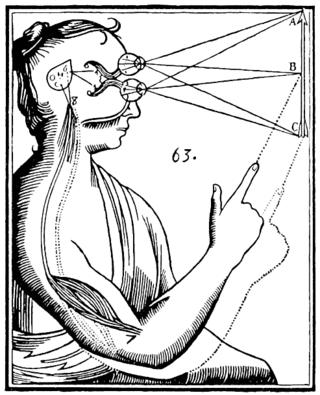
The mind–body problem is a philosophical problem concerning the relationship between thought and consciousness in the human mind and body.

A dogma of the Catholic Church is defined as "a truth revealed by God, which the magisterium of the Church declared as binding". The Catechism of the Catholic Church states:
The Church's Magisterium asserts that it exercises the authority it holds from Christ to the fullest extent when it defines dogmas, that is, when it proposes, in a form obliging Catholics to an irrevocable adherence of faith, truths contained in divine Revelation or also when it proposes, in a definitive way, truths having a necessary connection with these.

Philosophical Inquiries into the Essence of Human Freedom is an 1809 work by Friedrich Schelling. It was the last book he finished in his lifetime, running to some 90 pages of a single long essay. It is commonly referred to as his "Freiheitsschrift" or "freedom essay".
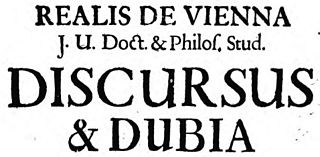
Gabriel Wagner was a radical German philosopher and materialist who wrote under the nom-de-plume Realis de Vienna. A follower of Spinoza and acquaintance of Leibniz, Wagner did not believe that the universe or bible were divine creations, and sought to extricate philosophy and science from the influence of theology. Wagner also held radical political views critical of the nobility and monarchy. After failing to establish lasting careers in cities throughout German-speaking Europe, Wagner died in or shortly after 1717.
Dutch philosophy is a broad branch of philosophy that discusses the contributions of Dutch philosophers to the discourse of Western philosophy and Renaissance philosophy. The philosophy, as its own entity, arose in the 16th and 17th centuries through the philosophical studies of Desiderius Erasmus and Baruch Spinoza. The adoption of the humanistic perspective by Erasmus, despite his Christian background, and rational but theocentric perspective expounded by Spinoza, supported each of these philosopher's works. In general, the philosophy revolved around acknowledging the reality of human self-determination and rational thought rather than focusing on traditional ideals of fatalism and virtue raised in Christianity. The roots of philosophical frameworks like the mind-body dualism and monism debate can also be traced to Dutch philosophy, which is attributed to 17th century philosopher René Descartes. Descartes was both a mathematician and philosopher during the Dutch Golden Age, despite being from the Kingdom of France. Modern Dutch philosophers like D.H. Th. Vollenhoven provided critical analyses on the dichotomy between dualism and monism.
In the theory developed by Spanish theologian Domingo Báñez and other Thomists of the 16th-century second scholasticism, physical premotion is a causal influence of God into a secondary cause which precedes and causes the actual motion of its causal power : it is the reduction of the power from potency to act. In this sense, it is a kind of divine concursus, the so-called concursus praevius advocated by the Thomists.
References
- ↑ Dictionary of Philosophy
- ↑ Ott, Ludwig (1961). Grundriss der Dogmatik. Freiburg-Basel-Wien: Herder. p. 107.
- ↑ Ott, Ludwig (1961). Grundriss der Dogmatik. Freiburg-Basel-Wien: Herder. p. 106.
- ↑ Leibniz on Divine Concurrence
- ↑ Spinoza, Principles of Descartes' Philosophy
- ↑ R.C. Sproul, "Divine Concurrence."
- ↑ Karl Barth, Church Dogmatics, III.3